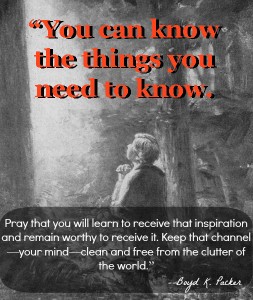One of the favorite accusations made by anti-Mormons is that they are a “secret” religion with many secret teachings. It is also sometimes said that they don’t tell their members what they really believe or what happened in their past. Mormons always snicker at these accusations.
 The usual response goes something like this: “Oh, yes, we’re very secretive. You’re right. We’ve been keeping the Spaulding Manuscript and Mountain Meadows a secret from our members. We had to hide the information, so we put it on the official church website for the entire world to see. We don’t want anyone to know what we really teach, so we put our actual lesson manuals free online—no registration required—where anyone can look at the manual and then show up at a Mormon class to find out if that’s really being taught. And we make our worship services open to the public—they are that secretive. Plus, of course, the magazines we publish for our members are free online. Oh, and we send thousands of missionaries all over the world to teach our beliefs. We even broadcast our world-wide conferences. You’re right—we’re so secretive.”
The usual response goes something like this: “Oh, yes, we’re very secretive. You’re right. We’ve been keeping the Spaulding Manuscript and Mountain Meadows a secret from our members. We had to hide the information, so we put it on the official church website for the entire world to see. We don’t want anyone to know what we really teach, so we put our actual lesson manuals free online—no registration required—where anyone can look at the manual and then show up at a Mormon class to find out if that’s really being taught. And we make our worship services open to the public—they are that secretive. Plus, of course, the magazines we publish for our members are free online. Oh, and we send thousands of missionaries all over the world to teach our beliefs. We even broadcast our world-wide conferences. You’re right—we’re so secretive.”
In truth, few religions have made their faith as public as the Mormons have. Even the “rule book” (handbook of instructions) is online. Our history is online, even the things people claim we’re keeping secret and we have researchers constantly searching for new insights and facts. The newest edition of the scriptures includes changes in chapter summaries (not actual scriptures) that reflect new scholarly research into Mormon history. The Joseph Smith Papers project has led to a multitude of new discoveries, all of which are being published.
I am often told Mormon leaders don’t want us to know about the Mountain Meadows Massacre, for instance. And yet, when I do a search at LDS.org, the official Mormon website for members, I find plenty of material on it. LDS.org, although aimed at members, is open to the public except for portions that are always open only to those with a need for the information—such as congregational membership lists or tools for specific church jobs. Mormon.org is a simpler site for people who are not Mormon. Both, however, can be accessed by anyone.
I found, searching for that subject, a scholarly article by a church historian on the Mountain Meadows Massacre. I found information on the memorials the Church has helped to erect and the memorial services they participated in. It’s pretty clear there is no secrecy involved since I could find information on it in seconds and you don’t normally erect memorials of things you want to hide.
When I was first learning about Mormonism (I’m a convert) people told me there are secret Mormon doctrines no one knows about and that Mormons don’t teach. Even then, that sounded ridiculous to me. If no one believes it, then it’s not a doctrine. It has no impact on you if you don’t know about it. There is, in other words, no point in having a doctrine and not telling your members about it, since, without knowledge, there is no action, no impact, no point.
Now, it is true that when you meet with the missionaries for a series of lessons prior to baptism, they won’t tell you every doctrine. That’s not a matter of secrecy. It’s just a matter of practicality. I’ve been a member since 1976 and I’m still learning new things. It’s a very complex faith and it takes an eternity to completely understand God’s teachings. However, the important things can be learned quickly, at least at a basic level. The missionary discussions focus on those areas. They cover the things you need to be doing in order to get baptized. Most importantly, they teach you how to pray for a testimony.
That is the most critical part of the process. When you meet with the missionaries, you will be told that you have not just the ability and the right to pray to know, directly from God, what is true, but you have the responsibility to do so. You are supposed to do it before you agree to be baptized. Most churches do not encourage that and in fact, I have encountered people from some other churches actively instructing people not to pray about what is true. If you know what you have is true, you don’t have to be afraid to encourage people to pray about it.
The response is often that you won’t know who is answering the prayer. James 1:5 promises us that if we lack wisdom, we are to ask of God and He will answer us. Since God instructed us to ask Him what is true, and promised to answer, we have nothing at all to fear. God always keeps His promises and that means He will help us know who is answering the prayer.
Learn why Mormons have so many rules.
Ask the Mormon missionaries to tell you more.
Because of that emphasis on praying for truth, rather than taking a mortal person’s word for it, secrecy is impossible to achieve and meaningless to try to achieve. If a person has prayed and asked God what is true, and is committed to acting on whatever God reveals, then there is no need for secrets. Some things are sacred, but nothing is secret.

